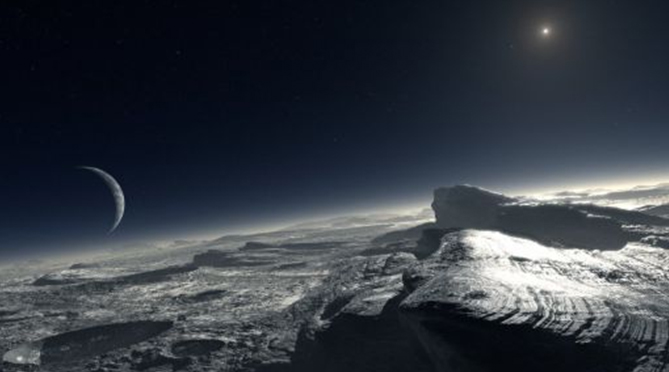
It’s hard to believe how far we are from anything else created by humankind. Except for our own, now-derelict third stage, nothing made by people or from the Earth — nothing — is within more than a billion miles of New Horizons.
From the latest news update of the New Horizons Project, NASA’s attempt to reach Pluto and the Kuiper Belt. The latter being the belt of Pluto sized planetoids at the edge of the classical Solar System. It’s some 30 to 55 Astronomical Units away; one AU being the distance from the Sun to the Earth, or about eight light minutes, or some 8 x 60 x 300,000 kilometres. Space is big, as Douglas Adams already noticed.
Space is not just big in distances, but also in time:
But you won’t have to wait another three years for our next significant distance and flight-time milestones — they come next year, when we cross the halfway point! But whenever quoting such milestones, I have to be careful about the meaning. So when will our spacecraft be halfway to Pluto? Well, that depends on which halfway you mean. (No, I am not kidding.)
- If one asks, when have we traveled half the flight time to reach Pluto? That halfway milestone occurs on October 17, 2010.
- But if one asks, when will we be half as far from the Sun as Pluto will be at the time of our encounter on July 14, 2015? That occurs somewhat earlier, on April 20, 2010.
- And if one asks, when will we have traveled half the heliocentric distance to Pluto from our launch at Earth? That milestone occurs even earlier, on February 25, 2010.
So, as you can see, the answer to the halfway question depends on precisely what it means to be halfway. In fact, you could even ask when the halfway day was from New Horizons project inception on December 20, 2000, to Pluto arrival on July 14, 2015 — that was April 4, 2008. Or one could ask about the halfway day from when we began our push for a Pluto mission on May 4, 1989 (when we had our first meeting with NASA officials) until Pluto encounter — that was on June 9, 2002. So in some ways we’re already halfway there, and in other ways, we have well over a year to go to reach the halfway point.
In other words, any big deep space mission consumes a significant chunk of somebody’s career. Sure, a trip to Pluto is an extreme example, but even missions to our planetary neighbours like Mars or Venus require years of planning, preparation and monitoring.
Science fiction is too often impatient with these distances, zooming around the Galaxy through Hyperspace or Warp speed or whatever. It’s all so easy that real life space travel just seems unnecesarilly complex and difficult. Now I like a good space opera as much as the next guy, but I would like to see more attention paid to our own Solar System, because it is vastly more complex and big as Golden Age Science Fiction ever suspected. Surely it must be possible to write a good, exciting novel taking into account the realities of space travel rather than resorting yet again to shortcuts?
(Paul McAuley, from whose blog I plucked this link, has done his bit with The Quiet War, which makes full use of the latest research results on what our solar system actually looks like.)
